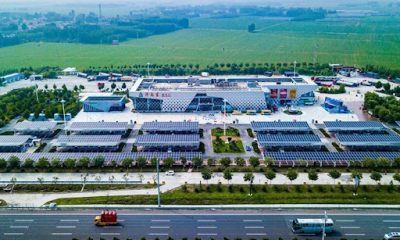News
Intelligent hospital in S China brings more convenience to patients
By Zheng Yi, People’s Daily
From establishing online hospital platforms, to launching surgical robots, and to building intelligent pharmacies, efforts have been made across China over the recent years to enrich the application scenarios of smart hospitals, with an aim to bring better medical services to the people.
The intelligent transition of the Liuzhou Worker’s Hospital in Liuzhou, south China’s Guangxi Zhuang autonomous region is a great example.
Li Fangfang recently had her first-ever hospital visit to the Liuzhou Worker’s Hospital. When she just arrived there, she opened on her mobile phone an in-hospital navigation mini program developed by the hospital and was soon guided to the cardiovascular department, the department she had registered for.
“It’s so convenient. I’ll never go the wrong way though the hospital is big,” Li said.
After entering the consulting room, Li explained her symptoms to cardiologist Xia Meng. “My chest has been feeling tight lately, and I don’t know why,” she told Xia.
Though Li had never been to the Liuzhou Worker’s Hospital, all of the medical images she had at other hospitals in Liuzhou were available to Xia.
According to Xia, the Liuzhou Worker’s Hospital was connected to a cloud platform launched by Liuzhou on April 1 this year, which records all diagnostic test results and case history of registered patients.
Doctors can also obtain patients’ ultrasound images, pathology images and magnetic resonance images, Xia told People’s Daily, adding that patients don’t have to take physical images with them when going to hospital, which is more convenient.
“Open the mini program of the hospital, pay on your phone and then you can get your prescription filled at the pharmacy,” Xia told Li after the diagnosis was over.
When Li arrived at the pharmacy, she saw two prescription vending machines loaded with various types of medicines.
“After patients pay the fees, their prescriptions will be transferred to the pharmacy. Then we print and scan the bar codes that carry their information, and the prescription will be automatically filled by the machines,” said Shi Yedui, associate chief pharmacist of the hospital’s department of pharmacy.
When Li was about to leave the hospital, a volunteer reminded her that she could consult doctors on the mini program if she had any questions about her illness and medication.
“It’s great to get free consultation with doctors anytime I want,” Li said.
At 9:00 am, there were many patients waiting to get blood tests at the clinical lab on the second floor of the outpatient building of the Liuzhou Worker’s Hospital.
“From drawing to sorting blood samples, we are assisted by automatic devices,” Wu Hao, chief technician of the clinical lab, told People’s Daily.
According to him, after a technician scans the QR code of a patient, an empty test tube with a barcode would pop out, and all the technician needs to do is to take the sample and put it onto a conveyor belt.
The conveyor would then carry the tube to the lab, where the blood sample is classified according to specific test requirements by a full-automatic system for mass spectrometry for the identification of microorganisms, Wu said.
The automatic system cuts the time of blood sampling by 40 percent to 50 percent, and is nearly twice as fast as manual operations.
Automatic devices are also widely applied in operating rooms. At around 7:00 pm, Wu Dongbo, director of the Inpatient Ward No.1 of the hospital’s general surgery department was performing a resection surgery with the assistance from a surgical robot. A robotic arm was seen moving near the operating table, while Wu was controlling the robotic arm at a control center 5 meters away from the patient.
“The surgical robot is capable of magnifying images 40 times at most, which provides clearer visions and thus makes surgeons more decisive,” said Zhang Yanzhuo, director of the anesthesiology department, adding that the robot can also significantly reduce the time of operation as it has higher limits than human hands.
Deputy chief nurse of the anesthesiology department’s operating room Liao Liwen told People’s Daily that families of patients can track the progress of surgeries on the hospital’s mini program. The operating room is also cyber-connected to the inpatient building, so that the departments where patients are registered can obtain first-hand information, Liao added.
Besides, the Liuzhou Worker’s Hospital also employs an intelligent logistics system to send medicines, specimens and consumables between departments. The system has 41 stations, and it takes about only six minutes for each run on average. It has carried a total of over 450,000 boxes since being put into use, or 485 per day averagely, significantly improving the efficiency of in-hospital logistics.
“In the future, we’ll further utilize artificial intelligence, cloud computing and other technologies to build a big data center with clinical medicine, scientific research and commercial operation at the core, so as to provide better, more efficient and more convenient medical services for patients,” said Huang Haixin, president of the Liuzhou Worker’s Hospital.
News
TCN Acknowledges 7th Grid Collapse in 2024

The Transmission Company of Nigeria (TCN) has reported its seventh partial grid collapse in 2024. Despite the recurring issue, TCN’s General Manager of Public Affairs, Ndidi Mbah, reassured the public that efforts to restore power are well underway, with about 90% of substations receiving bulk power.
Mbah noted that the Azura Power Station initiated the grid recovery, although a minor setback occurred. However, power supply has been restored to the Abuja region and other key distribution centers. The Ibom Gas Generating Station remained unaffected, continuing to supply power to the South-South region.
An investigation into the cause of the collapse will commence once full grid restoration is achieved.
News
Jigawa Tanker Tragedy: Shettima, First Lady Mourn Victims, Pledge Federal Support

Vice President Kashim Shettima has expressed deep sorrow over the tragic tanker explosion in Jigawa State, which claimed over 100 lives. In a statement issued by his media aide, Stanley Nkwocha, Shettima, on behalf of President Bola Tinubu, extended condolences to the affected families, praying for strength and comfort in their time of grief.
Shettima assured the public that the federal government is mobilizing resources to support the injured and assist those affected. He has directed the immediate deployment of the National Emergency Management Agency (NEMA) to provide aid. The Vice President also stressed the need for a review of fuel transportation safety protocols to prevent future incidents.
In a separate statement, First Lady Oluremi Tinubu offered her condolences to Jigawa Governor Umar Namadi and the people of Jigawa, praying for peace and comfort for the families affected. She called the incident “unfortunate” and extended prayers for the recovery of the injured and the repose of the souls lost in the tragedy.
News
Nigeria Customs Intercepts Arms, Ammunition Worth N9.5bn Over Six Years

The Nigeria Customs Service (NCS) has revealed that it intercepted a total of 10,598 pieces of arms and 114,929 rounds of ammunition valued at N9.58 billion over the past six years. Comptroller General of Customs, Bashir Adewale Adeniyi, made this disclosure during a press conference on enforcement activities in Zone A.
Adeniyi highlighted that 60% of these seizures occurred in 2023, reflecting the Customs’ increased efforts to curb arms smuggling. He also mentioned that recent operations such as Operation Whirlwind and Operation Swift Sting are part of a strategic response to tackle evolving smuggling tactics.
In addition to arms seizures, the Customs CG announced the largest pangolin scale seizure since 2020, with 9,493 kg of scales confiscated in collaboration with the Wildlife Justice Commission. The joint operation led to four arrests across Kano, Kaduna, and Lagos. The NCS continues to intensify efforts against wildlife trafficking, targeting supply routes in northern Nigeria and border areas.
-

 Business14 hours ago
Business14 hours agoOkpella Monarch: Obaseki Ratified Kingmakers Decision, End 5years leadership Vacuum
-

 Banking10 hours ago
Banking10 hours agoFree Food Saga: Akpabio quoted out of context-CSO
-

 Foreign15 hours ago
Foreign15 hours agoSci-tech innovation fuels China’s high-quality development
-

 Entertainment7 hours ago
Entertainment7 hours agoDavido Declares ‘Timeless’ His Best Album
-

 Entertainment7 hours ago
Entertainment7 hours ago‘Adire’ Secures Four Nominations at the Best of Nollywood Awards
-

 Business7 hours ago
Business7 hours agoWike Urges Nigerians to Pay Taxes for Improved Social Services
-

 Foreign9 hours ago
Foreign9 hours agoQinling Mountains better safeguarded with comprehensive digital platform
-

 Foreign9 hours ago
Foreign9 hours agoExpressway service station in Shandong achieves carbon neutrality






